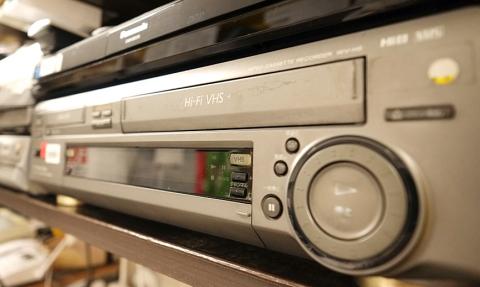The world’s last videocassette recorder (VCR) is set to roll off the factory line as a Japanese manufacturer ends production of the once booming home-theater technology.
Funai Electric Co, which says it is the world’s last VCR manufacturer, pointed to a sharp decline in demand and trouble sourcing parts for its decision to stop production at a plant in China this month.
In recent years, most of the consumer electronics firm’s VCRs were sold in North America, including under the Sanyo brand.

Photo: AFP
The clunky machines entered into mainstream popularity in the 1970s and 1980s, but have long been eclipsed by DVDs and other more advanced technologies.
Panasonic Corp withdrew from the business several years ago, making Funai the last VCR maker, a company spokesman said.
Funai once had annual global sales of about 15 million VCRs, a number that shrunk to 750,000 globally last year, he added.
“A company that was making parts for us said it was too tough to keep making them with sales at this level, so they stopped, which led to our decision — we can’t make them without that part,” he said.
Funai has been overwhelmed with calls from desperate VCR tape owners who had not copied weddings and other special occasions onto digital discs, he added.
Last year, Sony Corp announced it would stop selling Betamax video tapes, ending the storied history of a product that had been ousted years earlier by the more popular VHS tape format.
VHS later gave way to digital formats, such as DVDs, that have largely been replaced by online streaming technology.
Sony stopped making Betamax recorders in 2002, but it kept making tapes for die-hard fans.

NO BREAKTHROUGH? More substantial ‘deliverables,’ such as tariff reductions, would likely be saved for a meeting between Trump and Xi later this year, a trade expert said China launched two probes targeting the US semiconductor sector on Saturday ahead of talks between the two nations in Spain this week on trade, national security and the ownership of social media platform TikTok. China’s Ministry of Commerce announced an anti-dumping investigation into certain analog integrated circuits (ICs) imported from the US. The investigation is to target some commodity interface ICs and gate driver ICs, which are commonly made by US companies such as Texas Instruments Inc and ON Semiconductor Corp. The ministry also announced an anti-discrimination probe into US measures against China’s chip sector. US measures such as export curbs and tariffs

The US on Friday penalized two Chinese firms that acquired US chipmaking equipment for China’s top chipmaker, Semiconductor Manufacturing International Corp (SMIC, 中芯國際), including them among 32 entities that were added to the US Department of Commerce’s restricted trade list, a US government posting showed. Twenty-three of the 32 are in China. GMC Semiconductor Technology (Wuxi) Co (吉姆西半導體科技) and Jicun Semiconductor Technology (Shanghai) Co (吉存半導體科技) were placed on the list, formally known as the Entity List, for acquiring equipment for SMIC Northern Integrated Circuit Manufacturing (Beijing) Corp (中芯北方積體電路) and Semiconductor Manufacturing International (Beijing) Corp (中芯北京), the US Federal Register posting said. The

India’s ban of online money-based games could drive addicts to unregulated apps and offshore platforms that pose new financial and social risks, fantasy-sports gaming experts say. Indian Prime Minister Narendra Modi’s government banned real-money online games late last month, citing financial losses and addiction, leading to a shutdown of many apps offering paid fantasy cricket, rummy and poker games. “Many will move to offshore platforms, because of the addictive nature — they will find alternate means to get that dopamine hit,” said Viren Hemrajani, a Mumbai-based fantasy cricket analyst. “It [also] leads to fraud and scams, because everything is now

MORTGAGE WORRIES: About 34% of respondents to a survey said they would approach multiple lenders to pay for a home, while 29.2% said they would ask family for help New housing projects in Taiwan’s six special municipalities, as well as Hsinchu city and county, are projected to total NT$710.65 billion (US$23.61 billion) in the upcoming fall sales season, a record 30 percent decrease from a year earlier, as tighter mortgage rules prompt developers to pull back, property listing platform 591.com (591新建案) said yesterday. The number of projects has also fallen to 312, a more than 20 percent decrease year-on-year, underscoring weakening sentiment and momentum amid lingering policy and financing headwinds. New Taipei City and Taoyuan bucked the downturn in project value, while Taipei, Hsinchu city and county, Taichung, Tainan and Kaohsiung